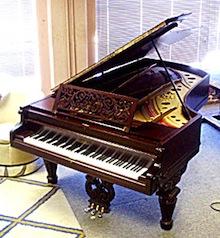If It's July, Can the Fall Season Be Far Behind?
If you're not yet in full celebration of the San Francisco Symphony's 100-year existence, its luxurious hardback (remember those?), Music for a City, Music for the World, published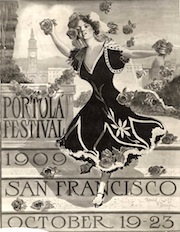 for the opening of the centennial season in September, will certainly put you in the mood.
for the opening of the centennial season in September, will certainly put you in the mood. This splendid commemorative book of history, essays, and reminiscences — all richly illustrated — is the work of SFS Publications Editor Larry Rothe. It is already available in the Davies Hall gift store and by online order. Wider distribution by Chronicle Books will come, in conjunction with the centennial exhibit in the San Francisco Main Library, opening Sept. 8.
Rothe begins the chronicle of the orchestra with the devastating drama of the Great Quake, a mere six years before the birth of SFS:
It started with the end of the world. The earthquake of 1906 destroyed one San Francisco and gave birth to another, also to a new orchestra — aimed at revitalizing the city's cultural life. Packed into that simple statement of ambition is a century-long story.An early milestone in the city's recovery was the 1909 Portolá Festival, celebrating Gaspar de Portolá's 1769 sighting of San Francisco Bay, the festival paving the way to the crucial 1915 Panama Pacific International Exposition, telling the world the city was back in business.That story is a tale of transformation and evolution, about how people who understood music's power began with an idea, then shaped into a cultural institution. Today we call the San Francisco Symphony great. That reputation was not conferred at birth. Such enterprises are always works in progress.
Rothe traces the twin progress of city and orchestra through chapters about a "guide to making an orchestra," personal struggles and musical triumphs, the crisis of the Great Depression and fortuitous rescue, eras under Pierre Monteux, Enrique Jorda, Josef Krips, and Seiji Ozawa, and then recent decades, leading up to Michael Tilson Thomas and today's fame, fortune, and potential.
"So the story continues," Rothe writes, "as does the music, which leads not to conclusions, but to the verge of what can be."
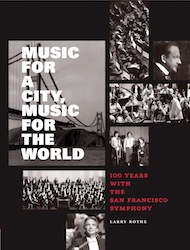
Season No. 100 begins with three days of civic and community celebrations — the opening gala on Sept. 7, a free birthday bash concert in Civic Center Plaza on Sept. 8, and the All-San Francisco Concert on Sept. 9.
And then, the first subscription concerts, conducted by MTT in September:
- Sept. 14-17, the Hindemith Cello Concerto, with Yo-Yo Ma; Brahms' Symphony No. 1 - Sept. 21-25, Mahler's Symphony No. 3, with mezzo Katarina Karnéus - Sept. 29-Oct. 1, Mozart's Symphony No. 35, the Thomas Adès/Tal Rosner Polaris: Voyage for Orchestra, Stravinsky's Petrushka
- Oct. 5-9, Vasily Petrenko conducting, Glazunov Violin Concerto, with Joshua Bell; Elgar's Symphony No. 1, works by Shostakovich and Tchaikovsky
- Oct. 14 and 16, James Conlon conducting, Shostakovich's Symphony No. 14, with soprano Olga Guryakova and baritone Sergei Leiferkus; Mussorgsky's Pictures at an Exhibition
- Oct. 19-22, Fabio Luisi conducting, Verdi's Requiem, with soprano Sondra Radvanovsky, mezzo Dolora Zajick, tenor Frank Lopardo, and bass Ain Anger
- Oct. 23-24, Gustavo Dudamel conducts the Los Angeles Philharmonic in music by John Adams, Enrico Chapela, Prokofiev, Stravinsky, and Berlioz
Gold from Rhine-by-the-Bay
San Francisco Opera's June–¬July 2011 performances of Wagner's four-opera cycle Der Ring des Nibelungen (The Ring of the Nibelung) sold to 99.96 percent of ticket capacity, 44,055 tickets across 14 performances, and generating $7.2 million in box office income.
Patrons traveled from 21 countries and 46 states to attend Ring performances at this, the sixth time the company has presented the cycle since 1935. David Gockley, general director of the Opera, said:
I am exceedingly pleased, despite a tough economic climate, to have been able to present this Mount Everest of operatic works with some of the preeminent Wagnerian artists of our day here in San Francisco. I salute the cast, creative team, crew, orchestra, chorus and administrative staff of this great company for their commitment to excellence and indefatigable spirit.Performances of Das Rheingold, Die Walküre, Siegfried and Götterdämmerung have been recorded for the San Francisco Opera International Radio Broadcast, available locally on Classical KDFC (90.3 in San Francisco, 89.9 in the North/East Bay, 89.7 in Eureka, 92.5 in Lakeport/Ukiah) on the following dates: Das Rheingold on Sept. 4, Die Walküre on Oct. 2, Siegfried on Nov. 6, and Götterdämmerung on Dec. 4.I also want to thank our loyal donors who gave so generously to make this new production possible and our enthusiastic audiences who came from around the world to join us for these outstanding performances. I will always cherish this Ring cycle as a highlight of my 40-year career in opera, and I am genuinely heartened by the broad scope of its success.
The Ring operas will also be broadcast both nationally and internationally through the WFMT Radio Network. At this time, the announcement says, there are no immediate plans to release this new San Francisco Opera Ring cycle on DVD or to remount this production in the near future.
YMP Summer Intensive in the Home Stretch
Will not rehash here an earlier story on UC Berkley's remarkable Young Musicians Program, but report instead Martin Katz' impressions of the organization, and what's coming by way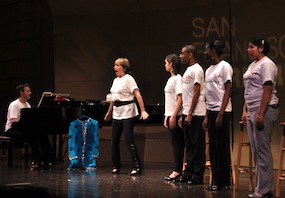 of free public events.
of free public events. The famed accompanist and conductor, who gave master classes both in Berkeley and at the Merola Program, taught at YMP at Frederica von Stade's invitation, and afterward, he was effusive in his praise:
Great things are being accomplished here daily, life-changing things. Kids who might have never had any access to the whole world of art, music, language, poetry, drama or dance are being immersed in it. No one is cutting them any slack; they are being held to the highest of standards, and they are responding big-time!Calling himself a "rather demanding teacher," Katz says he was "totally blown away by wonderful committed and enthusiastic performances. What an excellent investment in our future this program is!"
Besides an open house in UC Berkeley's Morrison Hall, 9 a.m. to noon, on July 29, here are some of the free student concerts open to the public, all in Hertz Hall:
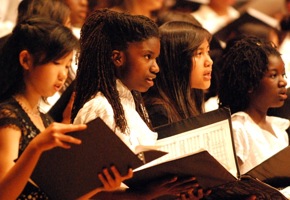
- Aug. 7, 3 p.m., "Vocal Showcase: A Poet's Voice," of works driven by great poetry, including from Shakespeare, Goethe, Langston Hughes, and Emily Dickinson. The concert includes the world premiere of the Othello Quartet, by 17-year-old Therese Chaix, of the YMP graduating class, admitted to the Manhattan School of Music.
- Aug. 10, 7:30 p.m., YMPYO: the only choral youth orchestra in the country (students both play in orchestra and sing in chorus), conducted by Ruben Capriles, featuring Metropolitan Opera tenor Rodrick Dixon, soprano Alfreda Burke, and baritone Daniel Washington. Works include Beethoven's Symphony No. 5 and opera excerpts.
- Aug. 12, 7:30 p.m., YMP Choraleers (junior chorus), conducted by Jeremy Winston; YMP Big Band, conducted by Ndugu Chancler.
- Aug. 14, 3 p.m., soloists, small ensembles, featuring performance of Schoenberg's String Quartet No. 2 by the Viennese Quartet, YMP students, and student soprano Melissa Angulo.
The Wonder of Verona
Talent is undefinable and undeniable. Case in point: California Shakespeare Theater's world premiere production of The Verona Project.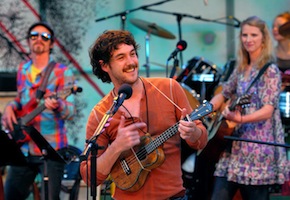
I went to the opening Saturday night expecting little, but ended up seeing a fresh, delightful, entertaining, explosively talented show.
Low expectations were based on considering an enterprise taking Shakespeare's first (and weak) play, The Two Gentlemen of Verona, and letting a group of young musician-actors have fun with it — but, to their credit, not spoofing or despoiling the little there is.
Music is the essential element of Project, and it's from Amanda Dehnert, who is also responsible for the adaptation and stage direction. Here, expectations were low again, especially from a personal point of view.
Not too promising, a wildly varied but low-key mix of a Nino Rota sound from old Italian movies (but without the aching sweetness of La strada), ballads, pseudo-reggae, garage-band pop-rock, world music, Andrew Lloyd Webber–wannabe, and more. Not my cuppa.
But again, talent will out, and Dehnert — with the vital assistance of the eight irrepressible musicians — wins the audience over.
The opening and closing song, "When We Were Young," and such big numbers as "The Quiet" and "Wait, Love, Wait, Run," among others, seem to come from different corners of the musical universe, but Dehnert is giving eclecticism a good name.
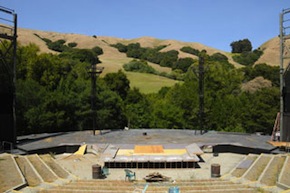
The music serves the play, the play takes flight on the wings of the music, such as it is, and all is well with the world. There are no virtuoso musicians in the cast, and their acting is stronger in comedy than in drama, but they put a smile on the audience's face, and it pretty much stays there throughout. Whatever this is, it works.
The two principal characters — Proteus and Valentine — are played outstandingly well by Dan Clegg (ukulele) and Nate Trinrud (saxophone). In Shakespeare, Valentine falls in love with Sylvia; in Project, it's Sylvio, played by Philip Mills (guitars, drums). In the original, the two friends clash as they vie for Sylvia ... well, you can see what the triangle will be like.
At least, Proteus' (early) flame, Julia — one of the first trouser roles of the many to follow in Elizabethan theater — remains a girl, all the better to switch gender and back again. Arwen Anderson (guitar, winds) plays the role with understated panache ... if there is such a thing.
With only two brief roles assigned to her, Marisa Duchowny (guitars, keys) makes the most of narrating, commenting, and generally providing a presence difficult to ignore. She, Clegg, and Mills are recent graduates of the A.C.T. MFA program. Harold Pierce (bass), Elena Wright (drums, percussion), and Adam Yazbeck, the Duke (accordion, piano), complete the cast.
And the reminder that's mandatory for every review of Cal Shakes productions in Orinda's Bruns Amphitheater: this unique, gorgeous watershed location becomes cold and windy at night (though super hot for matinees), so dress as if visiting Siberia. Ignore the warning, deal with frostbite.
Coming: 'National Dialogue' About Arts in San Francisco
There are few details yet, but the Arts Education Partnership, a branch of the National Education Association, will hold its fall conference here the week of Sept. 11, which is National Arts Education Week (and the opening of the S.F. Symphony and S.F. Opera seasons).NEA is supporting school systems experimenting with arts-based models of school reform. Research and evaluation results suggest that these initiatives are revitalizing schools and positively affecting students' lives. Such programs, says the association, demonstrate that arts education can engage students and move them toward success in school, work, and life; energize teaching and school leadership; and once again make our schools the dynamic and vibrant hubs of community engagement.
Ballet Stars in Napa
The Napa Valley Festival del Sole presents its second annual dance gala, "Stars of American and Russian Ballet," on July 22, in Yountville's Lincoln Theater. It is part of the Dede Wilsey Dance Series.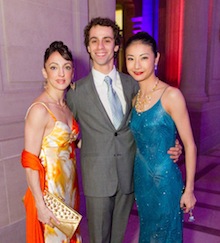
Featured dancers include Maxim Beloserkovsky and Irina Dvorovenko of American Ballet Theatre; Charles Askegard and Wendy Whelan of New York City Ballet; Vitor Luiz and Lorena Feijoo of San Francisco Ballet; and Marianna Ryzhkina, Denis Medvedev, and Mikhail Kryuchkov of the Bolshoi Ballet.
"This year Napa Valley Festival del Sole's dance gala offers audiences a chance to revisit classic works from the ballet repertoire, in scenes from Petipa's Swan Lake or Balanchine's Jewels," says Festival Director Richard Walker.
"The program also features a number of newer works which demonstrate the vitality and dynamism of ballet. Among them are Yuri Possokhov's Talk to Her, to Alberto Iglesias' score for Pedro Almodovár's 2002 film, and Vladimir Vasiliev's The Oath of Ushers, set to a movement of Gordon Getty's Ancestor Suite, which debuted to great acclaim at the Bolshoi Theater in 2009."
The program also includes excerpts from the Balanchine/Stravinsky Agon, Bournonville's La Sylphide, René Aubry's Black with choreography by Francesco Ventriglia, and the great Petipa showpiece, the pas de deux from Le Corsaire.
The Struggle to Obtain a Rebuilt 1892 Chickering (Real Cheap)
"Hello Music Lovers, from Steve Reading, Director, S.F. Conservatory of Music Concerts in Marin. As many of you know, our beautiful old Chickering grand was rendered unplayable and our last concert with the Delphi Trio was canceled."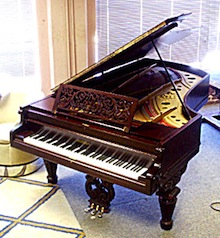
So begins the plea for rescuing a piano and a program. The piano was recently diagnosed as playable, but ...
It can no longer be moved to the stage and has some ongoing stuck notes related to old and dried wood in the key action which renders the adjusting screws to be frozen in place. This will require removal and restoration of the wood.But then, a miracle-in-the-making:In the past month I have been looking at options which will enable us to continue the concert series. These include (1) using ensembles without the piano; (2) pursuing a donated piano to replace the Chickering; (3) trying to present concerts with the piano on the main floor and adjusting the musicians' seating as well as possible to an awkward setup.
We have located a 1892 Chickering grand, virtually the twin of the one we now have at Novato United Methodist Church. However, this 1892 piano has been entirely rebuilt and refinished to virtually new condition by Patrick Fanning in Sebastopol.[Editor's note: Much more.]I liken our current piano to a Ford Model T which has driven 500,000 miles over 75 years, and is tired and unreliable, versus a newly restored Model T with everything in brand new, reliable, original condition, and ready to go for many more years.
Mr. Fanning spent several years carefully restoring this piano. He is offering it for $3,500, an extremely low price reflecting mainly the cost of the parts. The sound of this instrument is beautiful. It is easily worth twice or more than this asking price.
So, what to do?
Novato UMC, like all non-profit organizations (and most of you who are reading this), has suffered large budget re-alignment these past few years. The present piano was a gift to the church and there is no way NUMC can afford to buy a new piano at this time.I am asking anyone receiving this email to consider sending me a non-binding donation amount which you might be able to comfortably contribute to obtain this beautiful Chickering. We have a few weeks to put these together with other possible funds and to see if this piano can be purchased. These gifts would be tax-deductible through Novato United Methodist Church. They could be a memorial for someone. We might place a plaque with substantial donor names/memorials on or near the piano. I'm open to ideas.
Pianomania
The award-winning German-Austrian documentary of pianists and piano craftsmen — part of the 2010 S.F. International Film Festival — is going into commercial distribution, scheduled to open in San Francisco's Opera Plaza Cinemas on Aug. 5.
The subject of Pianomania is Stefan Knüpfer, Steinway & Sons' master piano tuner, doubling as physician and voice coach. Participating artists include Pierre-Laurent Aimard, Alfred Brendel, Lang Lang, Aleksey Igudesman, Richard Hyung-Ki Joo, and Stephan Knüpfer. The film has been correctly described as "a humorous and surprisingly suspenseful peek into the heated clash of wills between a genius craftsman and the renowned pianists who rely on his talent ... as they search together for that elusive perfect tone.
Besides winning SFIFF's Golden Gate Award for Best Feature Documentary, Pianomania has collected a number of awards in film festivals.
Changes at S.F. Arts Commission
San Francisco Arts Commission's Director of Cultural Affairs Luis Cancel has resigned from his position in the city organization providing money to artists, cultural centers, and the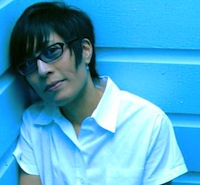 Symphony.
Symphony. Cancel told Mayor Ed Lee he is quitting the job, which pays $147,633 not including benefits, so that he can move back to New York. But the resignation, effective immediately, also comes shortly after news leaked that members of the commission felt Cancel had been spending too much time in Rio de Janeiro where he reportedly had a second home, according to the The San Francisco Examiner.
The Arts Commission's budget is $10.3 million in the current fiscal year; the commission also oversees the public art of major city buildings.
At a meeting on Monday, the commission appointed its own vice president, JD Beltran, as interim director.
"JD is a fantastic artist, a well respected member of the arts community, and a committed public servant dedicated to the well-being of this organization," said SFAC President PJ Johnston. "We're very fortunate that she's willing to step in and serve for this brief period."
"I see my role as one of placeholder, helping the Arts Commission get through this transition to its new director," Beltran said. "I have no interest in the permanent job — indeed, I'll need to get back to my work soon. But I do care deeply about the San Francisco Arts Commission, and I want to see it flourish."
The Music of Potter the Last
The big summer movie hoopla is Harry Potter and the Deathly Hallows, Part 2, the last, final, ultimate film in the series. On one hand, no review can be published until the U.S. release date of July 15; on the other, it is advertised with the tagline: "It all ends here," so the spoiler would be only if the "how" was to be revealed of this curious mixture of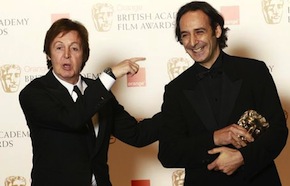 glacial passages, Ring references, and ultimate video-game spectacles.
glacial passages, Ring references, and ultimate video-game spectacles. You will not read a spoiler here, about Harry James (yes) Potter, the half-blood wizard born July 31, 1980, though if you can't wait to see the film for yourself, English publications — if not the late News of the World — are already running reviews. Here, as befits this column, the topic is Alexandre Desplat and his score for Potter.
Chances are you will not notice the music, and that's a recommendation by itself. But if you are listening for the score, as I cannot help doing, you will hear fine, melodic, pleasant music, and by pleasant I don't mean elevator sounds, but something pleasing.
Desplat is not really well-known in the U.S., but he should be. Composer of more than three dozen film scores, he has been receiving some major international awards recently, and should be looking for an Oscar when it's time for the next Academy Awards.
Just within the past year, Desplat received the 2011 César for the score of The Ghost Writer, won recognition in Cannes for A Tree of Life, and was named Film Composer of the Year for The King's Speech and received the top BAFTA (the British Oscar) award.
S.F. Opera Cast Changes
In the fall season's Lucrezia Borgia, Francesco Meli has withdrawn, replaced by Michael Fabiano. In Attila, Oksana Dyka and Ramon Vargas were reported to have withdrawn, to be replaced by Lucrezia Garcia and Fabio Sartori.Lisa Hirsch makes an interesting connection about the Attila changes: Garcia and Sartori, who replace Dyka and Vargas, are both appearing in the La Scala production now conducted by San Francisco Opera Music Director Luisotti. "Coincidence?" asks Hirsch. "I think not."

